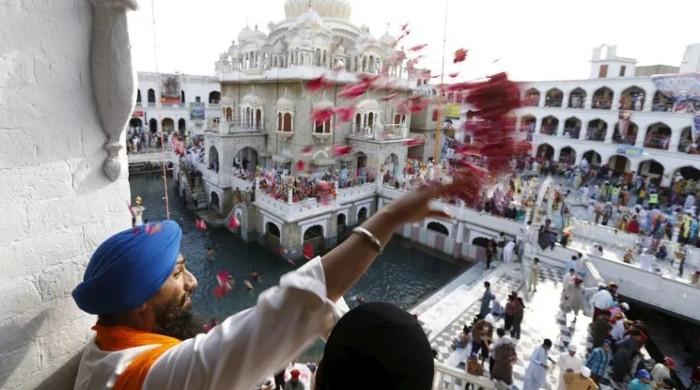Baisakhi Festival Celebrated in Punjab
Baisakhi festival, a centuries-old event that signifies the wheat harvest’s commencement, is being observed in Punjab .
Annually held around April 13th or 14th, this agricultural celebration is a significant cultural event in Punjab’s rural areas.
This day traditionally represents the culmination of crop-watching and the initiation of reaping the rewards of months-long labor. For farmers, it is a joyous occasion as their efforts materialize into tangible gains.
Before the Partition of India, Baisakhi festivals were lively events filled with folk traditions. Farmers gathered to the rhythm of drums, commencing the harvest. Women sang folk songs, accompanied by the drumbeats, while men and boys performed energetic dances in the fields.
However, with the advent of mechanization, customs have evolved. Combine harvesters and threshers have replaced communal harvesting practices, diminishing the day’s vibrancy.
While rooted in agrarian customs, Baisakhi also holds religious importance for the Sikh community, commemorating the establishment of the Khalsa by Guru Gobind Singh in 1699. Post-Partition, the festival became more closely linked with Sikhism and is now observed with a special ceremony at Gurdwara Panja Sahib in Hasan Abdal.
This year, the main celebration is taking place at Gurdwara Janam Asthan in Nankana Sahib, the birthplace of Guru Nanak.
In anticipation of the celebrations, the Pakistani High Commission in New Delhi issued over 6,500 visas to Indian pilgrims (Yatrees), enabling them to participate in the Baisakhi festival from April 10th to 19th.
The Indian pilgrims are visiting several revered gurdwaras across Pakistan, including Gurdwara Panja Sahib, Gurdwara Kartarpur Sahib, and Gurdwara Nankana Sahib.
These visits are conducted under the Pakistan-India Protocol on Visits to Religious Shrines of 1974, facilitating cross-border travel for religious purposes.
Charge d’Affaires Saad Ahmad Warraich stated that the issuance of a large number of visas by Pakistan reflects Islamabad’s commitment to fostering harmony and promoting understanding among peoples, cultures, and religions.
He affirmed that Pakistan would continue to support such visits to sacred sites.



Comments (0)
No comments yet. Be the first to comment!
Leave a Comment